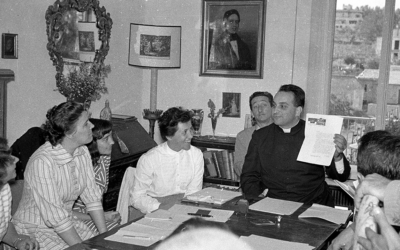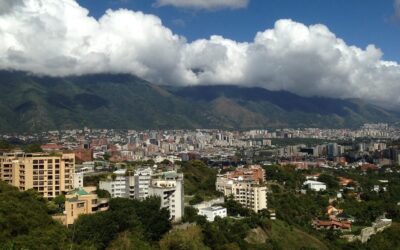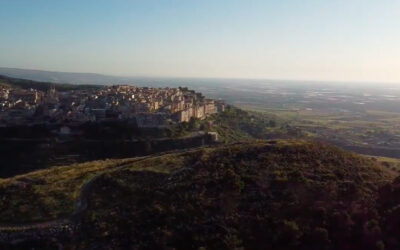 A sports coach from Saxony, East Germany describes how a long friendship with a Catholic priest began, in spite of the fact that the coach had no religious faith. “After the revolution of 1989 in the German Democratic Republic (GDR) sport club membership was no longer free due to cuts in subsidies, and many young people went over to neo-Nazi environments. And nobody did anything. In desperation I even approached a Catholic priest with whom I had never had anything to do before, to complain to him: Why doesn’t the Church do something?” Change of scene. An ex-officer in the people’s army and professor at the superior institute of state security – the GDR secret service – attended his 50th high school reunion where he met a classmate who had chosen a different path. His friend was now a priest. But their differing paths were not an obastacle to their being friends; indeed, it helped. During the final years of the German Democratic Republic (DDR) the professor had begun some research and for this reason was removed from his work post. His conception of socialist society was not compatible with the interests of the power system. Like others, these two characters – the coach and the professor from state security – have found a new perspective in the gatherings of the Focolare Movement. So it was that last May they attended meetings between Christians and people without a religious reference, at the Mariapolis Centre in Zwochau near Leipzig (5 – 9 May 2011).
A sports coach from Saxony, East Germany describes how a long friendship with a Catholic priest began, in spite of the fact that the coach had no religious faith. “After the revolution of 1989 in the German Democratic Republic (GDR) sport club membership was no longer free due to cuts in subsidies, and many young people went over to neo-Nazi environments. And nobody did anything. In desperation I even approached a Catholic priest with whom I had never had anything to do before, to complain to him: Why doesn’t the Church do something?” Change of scene. An ex-officer in the people’s army and professor at the superior institute of state security – the GDR secret service – attended his 50th high school reunion where he met a classmate who had chosen a different path. His friend was now a priest. But their differing paths were not an obastacle to their being friends; indeed, it helped. During the final years of the German Democratic Republic (DDR) the professor had begun some research and for this reason was removed from his work post. His conception of socialist society was not compatible with the interests of the power system. Like others, these two characters – the coach and the professor from state security – have found a new perspective in the gatherings of the Focolare Movement. So it was that last May they attended meetings between Christians and people without a religious reference, at the Mariapolis Centre in Zwochau near Leipzig (5 – 9 May 2011).

The Mariapolis Centre in Zwochau
The meeting was also attended by Claretta dal Rì, Nella Ammes and Franz Kronreif from the Focolare’s centre for “dialogue with people of no religion”. This center in Rocca di Papa coordinates and seeks to develop, on a global scale, a common path for men and women with and without a religious reference, on the basis of common values and mutual respect, which is born of love. Nobody tries to pull anyone over to the side of their own world view. As these two examples show, there is no adversity against religion or the church. There are places to meet when it comes to issues of common values. The most central contents of religion arouse interest and wonder. For most they are simply unfamiliar. Dialogue is required with great sensitivity that would allow people to discover the values and ideals of others and to find a language that manages to convey the treasure of one and the other group. “Our goal is a united world. We may not all be Christians. The dimensions are much larger. (…) The only thing that matters is love.” These words were spoken by Chiara Lubich when she spoke to members of the Movement about dialogue. A moment from a meeting in Zwochau demonstrates how much these “religiously inharmonious” people (to use Max Weber’s term) share this vision of life, of building a world that is united in brotherhood. A writer and journalist had just returned from a cruise. The content and goals of the Movement seemed so interesting and important to them that they talked to their fellow travelers, convinced that they surely knew about it. “But even a Catholic Bavarian with whom they dined said he had never heard of it before!” they observed. So they jumped at the invitation of spreading the idea of highlighting our common values. A few days later, in fact, upon the initiative of the journalist, an article was published in one of the areas newspapers about the meeting in Zwochau and the “Roman guests”.
 A sports coach from Saxony, East Germany describes how a long friendship with a Catholic priest began, in spite of the fact that the coach had no religious faith. “After the revolution of 1989 in the German Democratic Republic (GDR) sport club membership was no longer free due to cuts in subsidies, and many young people went over to neo-Nazi environments. And nobody did anything. In desperation I even approached a Catholic priest with whom I had never had anything to do before, to complain to him: Why doesn’t the Church do something?” Change of scene. An ex-officer in the people’s army and professor at the superior institute of state security – the GDR secret service – attended his 50th high school reunion where he met a classmate who had chosen a different path. His friend was now a priest. But their differing paths were not an obastacle to their being friends; indeed, it helped. During the final years of the German Democratic Republic (DDR) the professor had begun some research and for this reason was removed from his work post. His conception of socialist society was not compatible with the interests of the power system. Like others, these two characters – the coach and the professor from state security – have found a new perspective in the gatherings of the Focolare Movement. So it was that last May they attended meetings between Christians and people without a religious reference, at the Mariapolis Centre in Zwochau near Leipzig (5 – 9 May 2011).
A sports coach from Saxony, East Germany describes how a long friendship with a Catholic priest began, in spite of the fact that the coach had no religious faith. “After the revolution of 1989 in the German Democratic Republic (GDR) sport club membership was no longer free due to cuts in subsidies, and many young people went over to neo-Nazi environments. And nobody did anything. In desperation I even approached a Catholic priest with whom I had never had anything to do before, to complain to him: Why doesn’t the Church do something?” Change of scene. An ex-officer in the people’s army and professor at the superior institute of state security – the GDR secret service – attended his 50th high school reunion where he met a classmate who had chosen a different path. His friend was now a priest. But their differing paths were not an obastacle to their being friends; indeed, it helped. During the final years of the German Democratic Republic (DDR) the professor had begun some research and for this reason was removed from his work post. His conception of socialist society was not compatible with the interests of the power system. Like others, these two characters – the coach and the professor from state security – have found a new perspective in the gatherings of the Focolare Movement. So it was that last May they attended meetings between Christians and people without a religious reference, at the Mariapolis Centre in Zwochau near Leipzig (5 – 9 May 2011). 




0 Comments